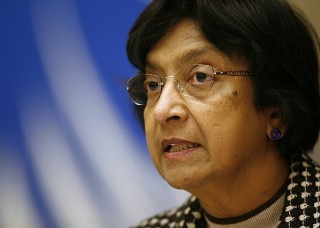S. Sudan’s warring parties urged to respect humanitarian law
April 12, 2015 (JUBA) – The UN commissioner for human rights has urged South Sudan’s warring parties to abide by international humanitarian law and end human rights violations.

The UNHRC said South Sudan had an obligation to desist from attacks on civilians, civilian objects and humanitarian facilities, cease indiscriminate and disproportionate attacks and ensure the facilitation of humanitarian access to territories under their control.
The report was prepared in cooperation with the UN Mission in South Sudan (UNMISS), covering the period from 15 August to 15 December 2014.
Tens of thousands of people have been killed and millions displaced since fighting broke out in South Sudan due political wrangles within the ruling Sudan People’s Liberation Movement (SPLM) in December 2013.
Various ceasefire agreements signed to halt the violence has failed to hold, as each side has repeatedly accused the other of violations.
However, the UN reports urges the warring parties to comply with all agreements signed under the auspices of the East African regional bloc (IGAD), including a January 2014 ceasefire deal and a 9 May 2014 agreement to resolve the conflict.
The latter calls for both parties to fully commit themselves to the Addis Ababa negotiation process and allow the deployment and strengthening of the IGAD Monitoring and Verification Mechanism in areas under their control.
According to the UN commissioner’s report, during the reporting period, while the intensity of fighting decreased, UNMISS continued to receive reports of human rights violations and abuses, including killings of civilians by parties to the conflict.
“Reports of killings of civilians by SPLM/A in Opposition in Renk county, Upper Nile State, in September 2014, and in Bentiu, Unity State, in October, were particularly alarming,” reads the 21 March report.
It further highlights cases of inter-communal violence, which reportedly escalated as a result of the conflict, with serious incidents resulting in the killing of civilians.
Besides the tension between the SPLA and the opposition forces, the proliferation of armed groups such as the Maban Defence Force and the reported resurrection of the White Army has posed additional threats to civilians, it says.
Talks between South Sudan’s conflicting parties has not succeeded, despite threats for sanctions by the UN Security Council on individuals obstructing the peace process, in addition to calls for an arms embargo on South Sudan.
“In Renk county, Upper Nile State, reports indicated that civilians were allegedly killed by opposition forces in connection with hostilities that took place in September 2014,” says the report.
Similar incidences were documented in Unity state capital Bentiu, where at least 11 civilians were reportedly killed by opposition forces when they tried to retake control of the city from the government on 29 October 2014. The report found civilians were deliberately targeted because of a perceived association with government forces.
Meanwhile, the UN appealed to the warring parties to facilitate the conduct of prompt investigations into allegations of serious violations of international humanitarian law and human rights violations and abuses committed by commanders, fighters and affiliated militia forces, including the unlawful killings of civilians in Bentiu in mid-April 2014.
(ST)
